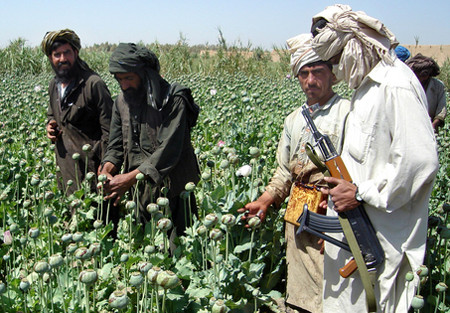By Maiwand Safi
KABUL, Afghanistan After several years of attempting to earn a living by growing crops other than poppies, frustrated farmers in Kapisa province are once again producing the raw material for heroin.
They say soaring drug prices, along with the government's failure to fulfill the promises it made as part of its eradication program, left them no choice.
"The government has made us many promises, but has not honored them," said Mohammad Ajan, a farmer in the Tagab district of the province. "I haven't cultivated poppy for the past few years. It's ruined my life. I could be making as much from growing poppy in one year as I'd earn from other crops in 10 years. Why shouldn't I grow it?"
Both Afghan government officials and representatives of the U.N. Office on Drugs and Crime had warned that poppy production was likely to soar in 2011 after blight killed off half of last year's poppy crop, driving prices up to their highest level since 2004.

Since the ouster of the Taliban government in 2001, the international community has spent billions of dollars on poppy-eradication and crop- substitution programs.
Initially, farmers were paid for destroying their poppy fields. The Afghan government eventually stopped that program and instead promised to provide farmers with seeds, fertilizers and infrastructure improvements so they could deliver their crops to market.
Many farmers say the central government never fulfilled its promises, prompting them to resume poppy cultivation.
Najib Safi, a local official with the counter-narcotics agency, acknowledged the government failed to fulfill its promise to undertake several reconstruction projects. He also said that the Ministry of Rural Rehabilitation and Development failed to find work for those who stopped growing poppies as it had promised.
Another provincial official, who asked that his name not be used, conceded that the government had failed to provide promised irrigation systems, fertilizers and improved types of seed to farmers who stopped growing poppies.
Ultimately, it may have been the soaring prices farmers could charge for their poppy crop that made switching back irresistible.
Samiullah, a landowner in Tagab district, said rising prices were a major factor in his decision to resume poppy cultivation.
"Last year, opium was priced at $90 per kilogram," he said. "This year, it's $380."
Abdul Alim Ayar, the head of counter-narcotics for Kapisa province, insists his department will once again wipe out the poppy crop.
"The (counter-narcotics) ministry drafted a law three months ago according to which anyone growing poppy will be punished," he insisted.
But at current prices, he may be fighting a losing battle.
ABOUT THE WRITER
Maiwand Safi is a reporter in Afghanistan who writes for The Institute for War & Peace Reporting, a nonprofit organization that trains journalists in areas of conflict. Readers may write to the author at the Institute for War & Peace Reporting, 48 Grays Inn Road, London WC1X 8LT, U.K.; Web site: www.iwpr.net. For information about IWPR's funding, please go to http://www.iwpr.net/index.pl?top-supporters.html.



